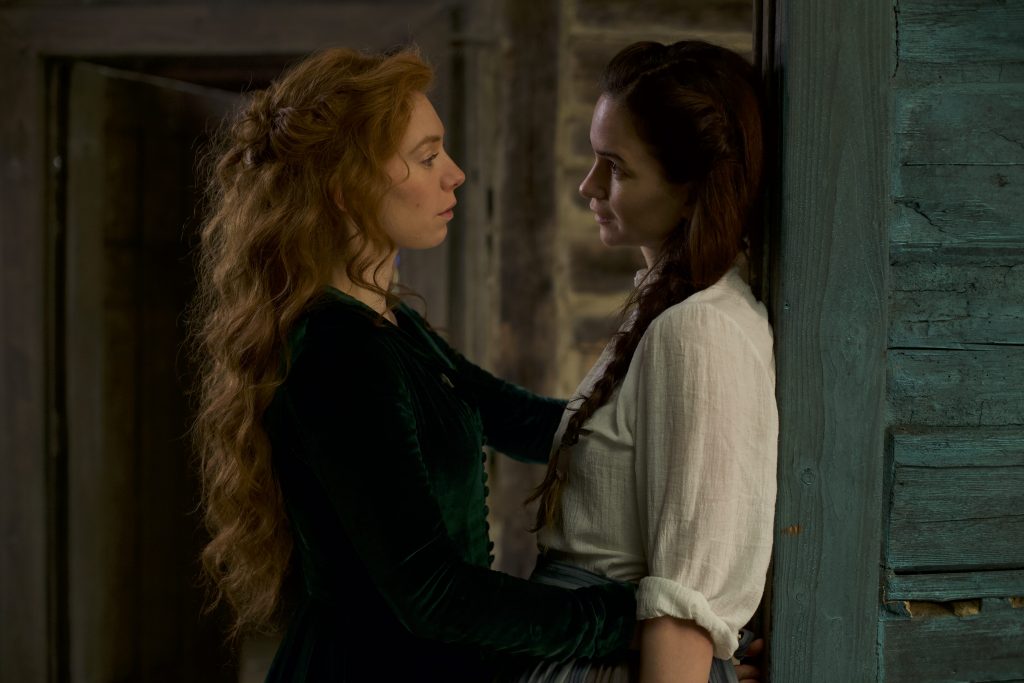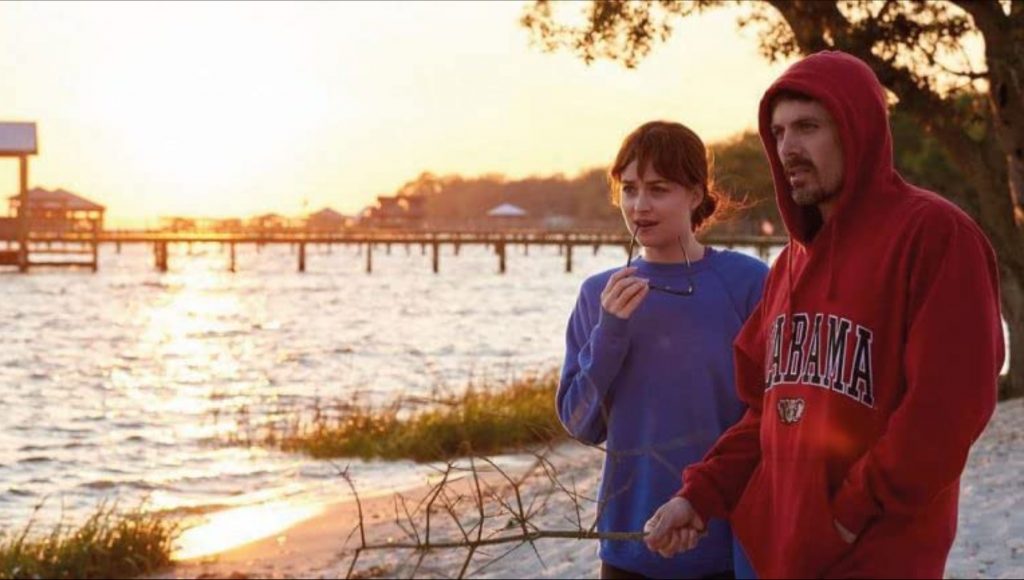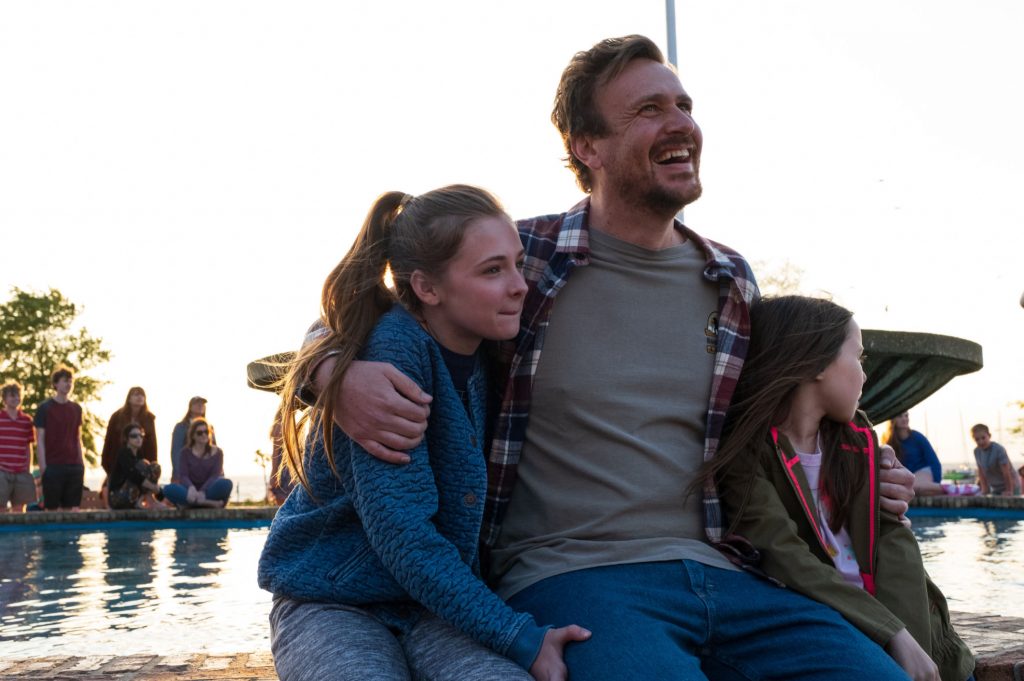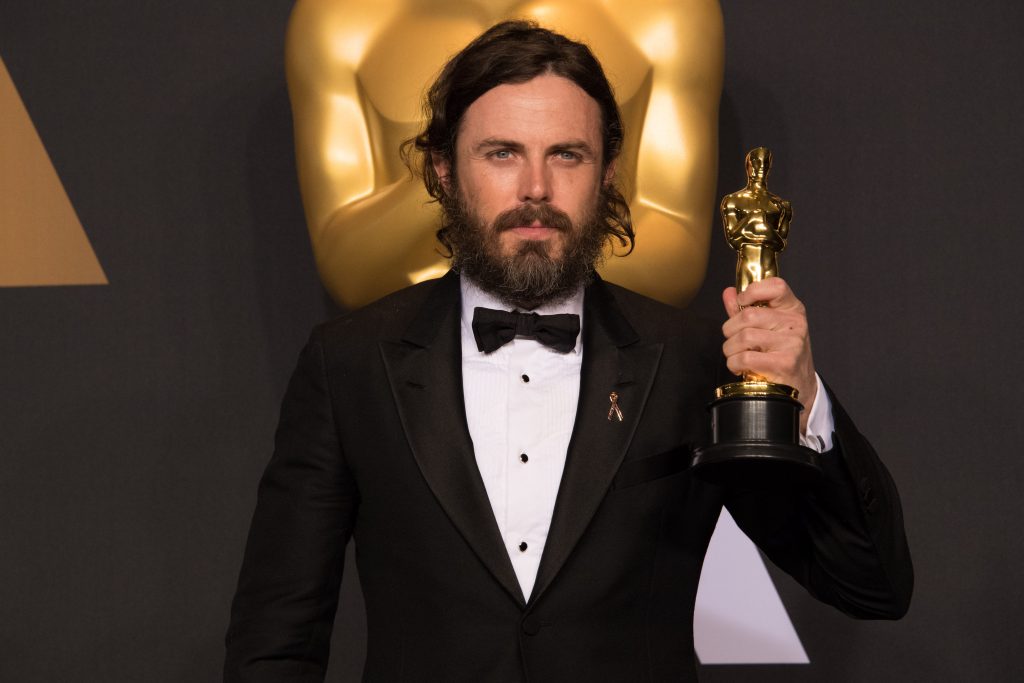July 19, 2023
by Carla Hay
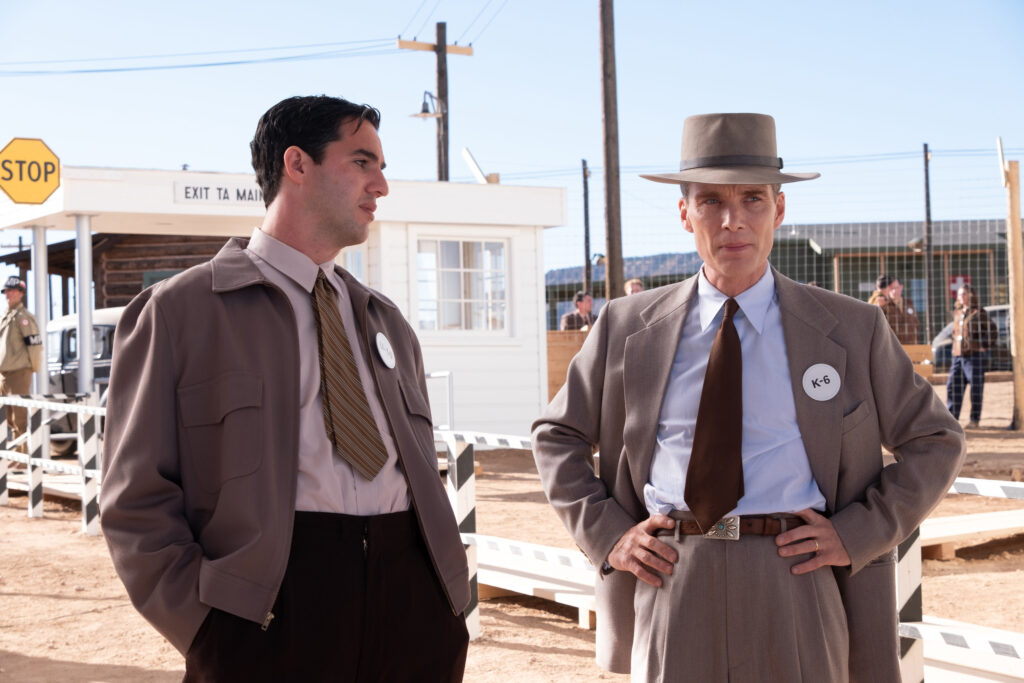
Directed by Christopher Nolan
Culture Representation: Taking place in the United States and in Europe, from the late 1920s to the late 1960s, the dramatic film “Oppenheimer” (based on the non-fiction book “American Prometheus: The Triumph and Tragedy of J. Robert Oppenheimer”) features a nearly all-white cast of characters (with a few Latinos) representing the working-class, middle-class and wealthy.
Culture Clash: American physicist J. Robert Oppenheimer invents the atomic bomb, which is used in Japan toward the end of World War II, but he struggles with the moral consequences of this invention.
Culture Audience: “Oppenheimer” will appeal primarily to people who are fans of filmmaker Christopher Nolan, the star headliners and history-based movies with a top-notch principal cast.

“Oppenheimer” has the words “awards bait” written all over it. This epic drama about atomic bomb inventor J. Robert Oppenheimer is crammed with showy performances from an all-star cast. The last third of the movie is the best and most meaningful section.
Written and directed by Christopher Nolan, “Oppenheimer” is based on Kai Bird and Martin J. Sherwin’s 2005 non-fiction book “American Prometheus: The Triumph and Tragedy of J. Robert Oppenheimer.” Oppenheimer was born in 1904 and died in 1967. This three-hour movie has a story that spans from the late 1920s to the late 1960s, with most of the story taking place in the 1940s and 1950s. It’s a very ambitious film that at times seems more interested in showing off how many famous cast members can be stuffed into quick-cutting scenes. The middle part of the movie tends to drag with some repetition, but the movie’s last hour is absolutely riveting.
J. Robert Oppenheimer, also known as Robert (played by Cillian Murphy, giving an award-worthy performance), is an intense and quietly brooding American theoretical physicist who is originally from New York, but he did his most significant work in remote areas of Los Alamos, New Mexico, where the atomic bomb was tested. The top-secret research into making the atomic bomb was called the Manhattan Project. The movie shows that Robert had mixed feelings about this invention, even before it was actually built. He also worried about how this bomb could possibly start a competition among other countries (specifically, Russia, then known as the Soviet Union) to make an even more destructive bomb.
The first hour of “Oppenheimer” cuts in and out of scenes so quickly, it does a disservice to the story by preventing viewers from getting to know the main characters better. After a while, the movie’s first hour just becomes a parade of big-name actors portraying scientists and government officials who have various debates about the merits and morality of the atomic bomb. It all becomes a bit long-winded, although the visuals in the movie are often stunning. Also noteworthy is composer Ludwig Göransson’s stirring “Oppenheimer” musical score.
There are repetitive mentions of Robert always feeling like the white Anglos who dominate the U.S. government will never truly accept him because he’s Jewish. There’s some antisemitism depicted in the movie, but the biggest prejudices in “Oppenheimer” have to do with political alliances. The movie’s story is steeped in people’s obsession with finding out who’s a Communist (or Communist ally) and who is not. This “Red Scare” would eventually be the undoing of more than one person in the story.
The other real-life people portrayed in “Oppenheimer” include Leslie Groves Jr. (played by Matt Damon), the politically conservative officer of the U.S. Army Corps. of Engineers and director of the Manhattan Project; Lewis Strauss (played by Robert Downey Jr.), the founding commissioner of the Atomic Energy Commission); and physicist Ernest Lawrence (played by Josh Hartnett), the extroverted inventor of the cyclotron, who befriends the more introverted Robert. Other real-life historical figures portrayed in “Oppenheimer” include Danish physicist Niels Bohr (played by Kenneth Branagh), a mutual admirer of Robert; hydrogen bomb inventor Edward Teller (played by Benny Safdie), an uneasy subordinate of Robert; and physicist Frank Oppenheimer (played by Dylan Arnold), Robert’s younger brother, who was recruited by Robert to work on the Manhattan Project.
And there’s more: Hans Bethe (played by Gustaf Skarsgård), the leader of the Manhattan Project’s theorist department; physicist/chemist Isidor Rabi (played by David Krumholtz), Robert’s longtime friend/advisor; Vannevar Bush (played by Matthew Modine), the leader of the Office of Scientific Research and Development; William Borden (played by David Dastmalchian), executive director of the U.S. Congress Joint Committee on Atomic Energy; and world-renowned scientist Albert Einstein (played by Tom Conti), who has a few contrived-looking scenes where he has private conversations with Robert.
And there’s even more: Jason Clarke as Roger Robb, special counsel to the Atomic Energy Commission; Macon Blair as Lloyd Garrison, Robert’s attorney; Rami Malek as physicist David Hill; Alden Ehrenreich as an unnamed U.S. Senate aide who works with Lewis Strauss; Casey Affleck as U.S. Army military intelligence officer Boris Pash; Dane DeHaan as civil engineer Kenneth Nichols. Also in the “Oppenheimer” cast are Tony Goldwyn as national security/defense government official Gordon Gray; Jack Quaid as physicist Richard Geynman; Josh Peck as physicist Kenneth Bainbridge; Alex Wolff as physicist Luiz Alvarez; and James Remar as U.S. government official Henry Stimson. Even with a cast packed with well-known actors, most of the supporting actors who are in the movie for less than 10 minutes each don’t have much to do but say their lines while sitting or standing in offices.
One of the best scenes in the movie is when Robert has a tension-filled meeting in 1945, with U.S. president Harry Truman (played Gary Oldman), who dismisses Robert’s concerns about the atomic bomb being a trigger for other countries, such as the Soviet Union, to get into an arms race to build an even more destructive bomb. The scene is less than 15 minutes long, but Oldman absolutely stands out as tough-talking President Truman, who has no regrets about deciding to drop the atomic bomb on the Japanese cities of Hiroshima and Nagasaki that year. President Truman scolds Robert by saying: “Do you think Hiroshima and Nagasaki care who invented the bomb? They care about who dropped it. I did!”
The only two women with prominent speaking roles in the movie are mainly there as love interests to the male protagonist, even though these women have their own careers. Florence Pugh plays a commitment-phobic, Stanford-educated psychiatrist named Jean Tatlock, who has a fling with Robert around the same time that he meets his future wife Katherine, nicknamed Kitty (played by Emily Blunt), who is an outspoken botanist/biologist. Robert was Kitty’s fourth husband.
Both women are portrayed as being “difficult” for Robert, who’s depicted as the “long-suffering” person who has to deal with these strong-willed and opinionated women. Robert is portrayed as a “romantic” who just can’t help falling for women who might be wrong for him. “Oppenheimer” absolutely excuses his affairs with married women, including Kitty, whom he got pregnant when she was married to her third husband. Robert’s responsibility in this homewrecking infidelity is glossed over in the movie with a “wink, wink, nudge nudge/boys will be boys” attitude, while Kitty gets the most of the shaming.
As was the case with many wives in the 1940s and 1950s, Kitty (who came from an affluent family) had to make her career take a back seat to her husband’s career while she was the primary caretaker of their two children: son Peter and daughter Toni. Kitty is very unhappy in New Mexico. Her mental health starts to deteriorate, and she has some addiction issues.
Despite her personal challenges, Kitty maintains a defiant nature. Kitty encourages Robert to stand up for himself when he becomes the target of a smear campaign by former ally Lewis Strauss, who spreads lies that Robert is a secret Communist who might have been a spy for the Russian government. Blunt gives a compelling performance that has a little more depth than the typical “loyal wife of the main character.” Downey has his moments to shine as the sneaky and duplicitous Lewis, but Downey performs in “Oppenheimer” like he’s trying too hard to win an Oscar.
“Oppenheimer” is a very “male gaze” movie that wallows in showing a lot of men in ego rivalries and power struggles, while all the women react to whatever the men do. Pugh being topless in her sex scene with Murphy is a very “male gaze” decision, since she didn’t need to be shown with her naked breasts exposed in this movie. Meanwhile, her male co-star had absolutely no “private parts” nudity in this sex scene. Directors really need to stop this blatant double standard about nudity in sex scenes, where women have to show some kind of nudity, while men do not have to show any nudity. It’s a very outdated double standard that’s a turnoff to many viewers who aren’t stuck in this type of backwards and sexist mindset.
The lead-up to the making of the atomic bomb isn’t nearly as interesting in “Oppenheimer” as what happens in the aftermath, when Robert struggles with the consequences of his invention. He becomes famous and lauded as a war hero in America, but with that fame come scrutiny and jealousy from some of the people he had trusted as colleagues. People who know what happened in real life to Oppenheimer can debate if what is shown in the movie is entirely accurate. The “Oppenheimer” movie obviously makes him look like a sympathetic person.
One of the ways that “Oppenheimer” depicts Robert’s guilt is when he hallucinates visions of people in front of him dying from the bomb, with their faces melting or their bodies being ripped apart. Curiously, he only envisions white people suffering from this catastrophe, not the thousands of Japanese people who were actually killed by the bomb he invented. It might be a tone-deaf part of the movie, or it might be writer/director Nolan’s way of showing that even “liberal” Robert Oppenheimer couldn’t see past his own insular world that has no racial diversity.
“Oppenheimer” is not the masterpiece that some people might hail it to be. As a history-based drama, it’s got a very narrow point of view. However, the performances by Murphy, Blunt and Oldman elevate this very long movie, even if much of the dialogue is basic and perfunctory. During the course of the story, Robert Oppenheimer goes from being an underdog to a hero to an embattled public figure. It’s this most difficult phase of his life that brings out his true character and the best that “Oppenheimer” has to offer.
Universal Pictures will release “Oppenheimer” in U.S. cinemas on July 21, 2023.

